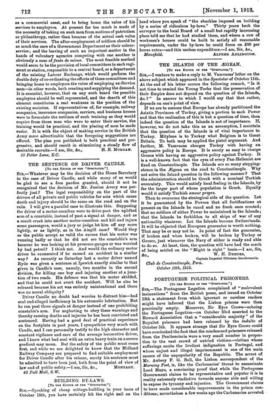PORTUGUESE POLITICAL PRISONERS.
[To TER EDITOR OF THZ " SPECTATOR."' SIR,—The Portuguese Legation complained of "malevolent insinuations" from the British press, and issued on October 13th a statement from which ignorant or careless readers might have inferred that the Lisbon prisons were then practically empty. Moreover, Sir Eyre Crowe—echoing the Portuguese Legation—on October 23rd asserted to the Howard Association that a "considerable majority" of the Royalist prisoners had been released by the indult° of October 5th. It appears strange that Sir Eyre Crowe could have overlooked the fact that the condemned prisoners released from the Penitenciaria were a very small number in propor- tion to the vast crowd of untried victims—victims whose sufferings excite the liveliest indignation in Portugal, and whose unjust and illegal imprisonment is one of the main causes of the unpopularity of the Republic. The arrest of Mr. Aubrey F. G. Bell, the Lisbon correspondent of the Morning Post, is, like the Carbonarios' threat to assassinate Lord Mayo, a convincing proof that while the Portuguese Government claims to be representative and popular it is in reality extremely vindictive towards anyone able and willing to expose its tyranny and injustice. The Government claims to have made considerable improvements in the prison con- ditions; nevertheless a few weeks ago the Carbonarioa arrested
a Portuguese subject for having in his possession a list of questions bearing upon the state of those same prisons. It is obvious that were the prisons the "example to the civilized world" which the Republic boasts them to be, it would not be necessary to imprison people who ask questions about them.
On September 29th Mr. Francis McCullagh, the well-known war correspondent, after a visit to the Limoeiro and the Penitenciaria, wrote to me: "Of how the Republicans treat their political prisoners much has been said and written, but nothing that is half strong enough. . . . No words at my command can adequately convey my indignation at what I have seen." Mr. llfcCullagh alluded not only to the ill- treatment of the Royalist prisoners, but of the numerous Republicans who, for real or suspected disaffection to the present autocracy, are suffering with their Royalist brethren. The sum total of prisoners it is almost impossible to estimate, as, even prior to the recent rising, arrests continued every day, and usually upon most trivial pretexts. It should be borne in mind that to rescue the political prisoners was one of the main items on the programme of the insurrectos, and if it is urged that the attempted risings against the Republic necessitate the imprisonment of thousands of Portuguese of all classes, I must reply that it is precisely these imprison- ments which cause the risings, and that the Republic might still take root if by its actions it would convert its critics instead of locking them up.—I am, Sir, &c.,
Yokes Court, nr. Sittingbourne, Kent. E. M. TErrisoN.































































 Previous page
Previous page